- Home
- Melody Carlson
The Christmas Cat Page 2
The Christmas Cat Read online
Page 2
Garrison had understood when Gram had taken in her first cat. The big orange tabby she named Genevieve had seemed like good company for her. And Garrison knew that Gram had loved having cats as a child. He also knew that she grew very lonely when he left for college on the East Coast. He had actually been comforted to know she had Genevieve’s companionship, and he’d told himself that he could simply take his allergy medicine whenever he came home. But over time his visits home grew rare. He claimed it was because of the cost of travel, but he knew it was also because of the cat. He learned quickly that visiting Gram for more than just a couple of hours put his health at risk. For her sake, though, he had tried to play it down. He never revealed to Gram that sometimes it felt as if she’d chosen the cat over him. He knew that would be selfish.
As Garrison walked from the downtown bus stop toward the old neighborhood, he noticed that some people were giving him curious glances. With his longish dark hair and layered clothes, beat-up duffle bag and backpack, he probably looked suspicious. The fact that he hadn’t shaved probably didn’t help much either. His plan was to drop off his bag, peel off some clothes, drive Gram’s old Pontiac back to town for a quick bite, and then meet with the lawyer at two.
The neighborhood looked even more run-down than he remembered. Not only that, some of the trees had been cut down, giving it a stark and somewhat desolate appearance. And due to the chilly weather, no one was out and about. As he turned onto Gram’s street, he wondered if she still kept a house key under the same flowerpot on the back porch. But if it wasn’t there, he could always call on Ruby next door. Mr. Miller had mentioned she was seeing to Gram’s cats, so Garrison knew she would have a key.
Gram’s two-story white house still had the same sweet welcoming look at first glance, but as he got closer he could see that the paint was peeling and some of the shutters were sagging. He must’ve missed that when he’d dropped in with Randall several months ago. It had already been dusky when they’d arrived, and thanks to the cats, they hadn’t stayed long.
He went to the back porch where he found a tarnished key beneath a wilted pot of geraniums. He dumped his bags on the porch steps and let himself inside, where he immediately started to sniffle and then sneeze. He’d taken allergy meds early this morning, but clearly they had worn off. He could smell the musty aroma of cats, but didn’t see any, and without looking around—and hoping that perhaps they had all been carted off to some shelter—he held his breath as he opened the kitchen cupboard where Gram kept spare keys. Finding the set for the Pontiac, he hurried back outside, gasping to get a breath of fresh air.
But it was too late. As he went over to the small unattached garage, his eyes were already watering and his sneezing was getting louder. So much for his plan to change clothes at Gram’s house. He had no intention of remaining in that house for one moment longer than necessary.
“Garrison? Is that you?”
He paused from going into the garage. “Ruby?” He peered at the short, rounded woman. Her hair had turned snowy white, but her skin was still the color of an old copper penny and not nearly as wrinkled as he would’ve imagined.
“Land sakes!” she declared as she hurried over. “I heard all that sneezing and I thought it must be you.” She threw her arms around him. “Welcome home, boy.”
“Thank you, Ruby.” He erupted into a new seizure of sneezing.
“You still have those allergies?”
“The cats”—he sneezed loudly—“triggered it.” He reached into the pocket of his backpack for his allergy pills. “I need to take one of these.”
“You need some water to wash it down?”
“Ye-yes.” He sneezed again. “Please!”
“Come on.” She tugged on his arm. “Let’s get you inside where it’s warm.”
He didn’t protest as she led him to her house, which was similar to Gram’s only smaller. And it was still painted a cheerful yellow with white trim. “How have you been, Ruby?”
“Well, it was a blow to lose Lilly. Can’t deny that. And you know my William passed on last spring.” She opened the door, tugging him into her cozy kitchen where she quickly filled a glass of water and handed it to him. “Ain’t easy gettin’ old.”
“I’m sorry about William.” He popped a pill into his mouth and gulped the water.
“Thank you. I’m real sorry for your loss too, Garrison. Lilly was a fine woman.” She pulled out a kitchen stool with a cracked plastic seat and pointed at him as if she expected him to sit.
He eased himself onto the stool, still sniffling.
“You want something else. Something to eat?”
“Sounds good, but I should probably be on my way soon.”
“How ’bout some apple juice? Or a nice hot cup of tea? Cocoa?”
“You have cocoa?”
“Just the instant kind, but I—”
“That sounds perfect, Ruby. Walking from the bus stop made me feel chilled to the bone. I’m still not used to this climate. Uganda was so much warmer.”
“And I know you got malaria while you were over there.” She grimly shook her head as she turned the gas on beneath a cherry-red teakettle. “Thought you’d know better than that, young man. Lilly told me all about it. How you forgot to take your malaria medication and got yourself sicker than a dog.” She made a tsking sound in her teeth. “Shame on you, Garrison.”
Feeling like he was twelve again, he stared down at her plastic topped countertop—same old yellow-and-green daisies, only now it looked retro—straight out of the sixties, and it took him straight back to his childhood. “I know,” he confessed. “I was really diligent about taking the anti-malarial meds at first. But time went by . . . things got busy . . . I suppose I got a little careless. Unfortunately the chances of contracting malaria increase. The longer you stay in the country the more likely you are to contract it.”
She patted him on the back. “Well, never mind that. I shouldn’t have chided you for it. What you did over there in Uganda—that was angels’ work, Garrison. God bless you for doing it. Lilly was real proud of you too. How many wells did you dig over there anyway?”
“A lot of people helped with the digging, Ruby.”
“Oh, I know that, boy. But you were the brains. I know how you managed to work with the government and plan for the digging and everything. So how many you think you got put in?”
He shrugged as he unzipped his jacket. “Truth is, I sort of lost count after thirty.”
She slowly shook her head. “To think that all those villages got good clean water thanks to you, Garrison.”
He grinned. “And thanks to you too, Ruby. I happen to know that you faithfully sent money to the project. Just like Gram and lots of other generous supporters. We never could’ve done what we did without all that financial support. Takes a team to make a well.”
“Not to mention our prayers,” she reminded him. “That must’ve helped too.”
He nodded.
“So what’ll you do with yourself now that you’re home?” She turned to the whistling kettle. “Any big plans?”
He pressed his lips together, wondering how much to divulge to Ruby. Then he remembered that she was Gram’s best friend and confidante. And he had fully intended to tell Gram about his most recent dream. Why not tell Ruby? “Well . . . you know what I really want to do?” he said slowly. “Something I haven’t told anyone . . . yet.”
Her eyes lit up as she stirred the hot water into the cocoa powder. “What is it, Garrison? I’d just love to hear about it.” She set the steaming cup in front of him.
“I know I can’t make this dream happen right away.” He paused to take a sip. “I realize I’ll need to raise some funds first. But I’d really like to make a halfway house for young men.”
“A halfway house?” She looked curious. “What is that?”
“A place for guys to get better,” he explained. “You see, a friend of mine in Uganda told me about his younger brother Jacob. This poor kid really str
uggled with addiction in his teens. When he was twenty he completed a thirty-day treatment program, but he just couldn’t seem to get his feet solidly under him. Jacob eventually fell back into his old ways . . . died of an overdose just last year. My friend was devastated.”
“Oh my.” She paused from dipping a tea bag in her own cup. “How tragic.”
“Yeah. And, even though I haven’t had an addiction problem myself, I can relate to feeling disconnected. Being forced to give up Uganda . . . not having a job or a home to speak of . . . well, I can kind of understand how discouraged a young man might get. I get how he might want a place to call home . . . a way to connect with others.”
“That sounds like a good dream, Garrison. I hope you get to build your halfway house. I’m going to put it on my prayer list.”
“I plan to call it Jacob’s House,” he confided.
“Good, solid name. And I can just imagine it, Garrison. A homey place where a young man can get free from his old drug connections.” Her dark eyes grew sad. “My grandson Elliott could use a place like that.”
“Really?” Garrison remembered when Ruby’s daughter Saundra used to bring her little boy to visit with Ruby. “How old is he now?”
“Twenty-four . . . going on fourteen.”
Garrison nodded sadly. “Too bad.”
“The poor boy has had some real struggles.” She took a sip of tea. “Don’t like to dwell on it too much. Better to just pray instead. Maybe the good Lord knows how to fix Elliott. Because I sure don’t.” She looked hopefully at Garrison. “But maybe you’ll build something that can help—Jacob’s House. I like the sound of it.”
“Well, it’s just a dream at this stage . . . but God willing . . . who knows?”
“Maybe you could use Lilly’s house,” she suggested eagerly. “It’s got those four bedrooms.”
He sighed. “That would be nice, but Gram had a reverse mortgage on it. She did that to pay for my college tuition and to make ends meet. I had always hoped to pay her back by now, but then I went to Uganda instead. Not exactly a get-rich-quick scheme. I’m sure that all her equity is gone by now.”
“Yes, well, don’t feel bad about that. Putting you through college and seeing you going off to Africa to help folks there—that was exactly what Lilly wanted for you. And you know what she believed, Garrison, the good Lord will provide. She never worried one minute about money. You shouldn’t either.”
He forced a smile. For the most part, he agreed with Ruby. But sometimes that “not worrying” thing was easier said than done. As he finished his cocoa, he asked if he could use her bathroom. “I’d like to freshen up and change my clothes before I go to see Gram’s lawyer. I’d do it at Gram’s . . . but those cats.”
“Of course. You just make yourself at home, Garrison. There are no cats in this house.” She frowned. “But I’ve been growing quite attached to Viola.”
“Viola?”
“One of Lilly’s cats.” Her eyes lit up. “She’s a big, beautiful gray cat with the softest coat of fur. I think Lilly said she is a Russian Blue, and I’ve always admired her. I think she’s about twelve years old. My William never wanted a cat in the house. But now that he’s gone . . .” She sighed. “Anyway, if you need to find homes for those cats, I’d like to be the first in line for Viola.”
“Yes, of course,” he eagerly agreed. “I don’t see any reason you couldn’t have her. For all I care, you can have all of the cats, Ruby.”
She chuckled. “No sirree. Thank you very much. I used to take care of them for Lilly when she was gone. Not that she was gone much—that many cats tie a body down. Believe you me, I know how much work they can be. Lilly might’ve liked a houseful of cats, but it’s not for me. Besides that, I couldn’t afford all the cat food or vet bills. I probably can’t afford to take in Viola.” Her smile faded a little. “But I sure would enjoy having her for company.”
“Well, as far as I’m concerned, Viola is all yours, Ruby.”
Garrison felt a bit more presentable by the time he walked into the law office at two. Mr. Miller firmly shook his hand and once again expressed his sympathy. “Have a seat,” he said, and waved to a black leather chair across from his sleek desk.
“Thanks for taking time to meet with me,” Garrison said as he sat. “I doubt there’s much estate to deal with, but I want to do things right. And I’m aware that my grandmother had a reverse mortgage on her home. I assume what little equity she had has been eaten up with taxes by now. And besides her old car, which needs some work, and a few household goods, I doubt there is much to discuss.”
Mr. Miller didn’t respond to this as he opened a large file folder.
“Oh . . .” Garrison cringed. “Unless she had debts. I hadn’t really considered that, but I suppose it’s likely. I know my college tuition was costly. And she helped support me in Uganda. I hope she didn’t incur debt as a result. Although I will pay it all back if she did. I mean, I’m currently unemployed, but as soon as I get a—”
“No, no, don’t worry. Your grandmother had no debt, Garrison.” Mr. Miller looked across his desk. “In fact, she paid back her reverse mortgage about seven years ago.”
“What?” Garrison was shocked. “How on earth did she manage to do that? She had nothing beyond some skimpy Social Security. You’re probably aware that my grandparents were missionaries. I know for a fact that my grandmother lived as frugally as a church mouse.”
“That might be so,” Mr. Miller said. “But she had money.”
Garrison frowned. “How is that possible?”
“Did Mrs. Brown tell you much about her parents?”
He tried to remember. “Well, she mentioned that they were opposed to her marriage to my grandfather. They thought she was throwing her life away to become a missionary. So they were kind of estranged. That’s about all I know.”
“Apparently her parents were fairly well off. Your grandmother’s father was involved in the early days of the airline industry. He passed away about twenty years ago, leaving everything to his second wife. Then she passed away while you were overseas. According to your great-grandfather’s will, the remains of his estate went to your grandmother.”
Garrison was trying to absorb this. “So Gram wasn’t poor? She was rich?”
“She wasn’t a millionaire. And, as you mentioned, she continued to live quite frugally. I suspect she was comfortable with her lifestyle.” Mr. Miller held up what looked like a bank statement. “The most money she ever spent was in donations—primarily to the Uganda Water Project. Her records show that she sent in a generous check every single month since inheriting the money.”
“The Uganda Water Project?” He studied Mr. Miller. “That was the mission group that I worked with. I know she donated to it. But I never thought she could afford to give very much.”
“Well, according to this, her support was significant. It appears that her checks were funneled through the church, but it was definitely designated to the water project. Your grandmother obviously believed in it. She’s even left a nice endowment for the project.”
“Wow . . .” He slowly shook his head, trying to absorb this. “I had no idea.”
Mr. Miller flipped through some papers. “I’d like to go over the details of her will, Garrison. It is, well, shall I say a bit unconventional.”
“Okay.” Garrison leaned forward to listen.
“As you know, Lilly was very fond of her cats. But she was also well aware that you have severe cat allergies. She knew that she couldn’t expect you to take care of them after she was gone. So she has asked you to take guardianship of the cats until you can find them each a good home.”
“Oh?” He nodded. “That shouldn’t be hard. In fact, I think I already found one home already.”
“Not so fast.” Mr. Miller held up a page. “There are some very specific stipulations for the placement of the cats.”
“Oh . . . okay. What kind of stipulations?”
“Your grandmother made a list.
Naturally, I’ll give you a copy of all this, but I did promise your grandmother that I’d go over the whole thing with you. She suspected you’d be a bit surprised. She wanted to be certain that you thoroughly understood and accepted her plans.”
“That’s fine. Go ahead.”
Mr. Miller cleared his throat. “First of all, the cats can only be placed in approved families. Second, the adoptive families must live in Mrs. Brown’s neighborhood.”
“That sounds doable.”
“And the adoptive families must have resided in that neighborhood for at least a year. Mrs. Brown wants to be assured they’re not transient. And the homes must be approved. Meaning that they are clean and safe for pets. She’s made another checklist for this.”
“Seriously?” Garrison shook his head. “It sounds more like finding homes for children than for cats.”
“Her cats were her children.”
“Well . . . yeah . . . I know.”
“Do you want to hear the rest?”
“Of course.” Garrison leaned back.
“The adoptive homes must have at least one person in the house for the better part of the day so that the cats aren’t left alone for long periods of time. And if the cats are placed with married couples, the marriage needs to be stable and solid.”
Garrison frowned. “How am I supposed to know—”
“Mrs. Brown has a list for that too.” Mr. Miller peered over the top of the paper. “It’s all in a packet for you. Shall I continue?”

 The Happy Camper
The Happy Camper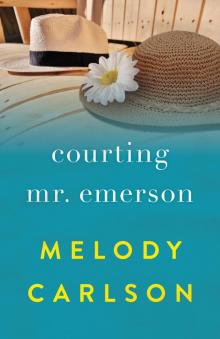 Courting Mr. Emerson
Courting Mr. Emerson The Christmas Swap
The Christmas Swap Lost in Las Vegas
Lost in Las Vegas The Christmas Shoppe
The Christmas Shoppe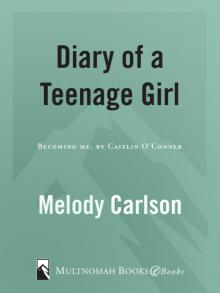 Becoming Me
Becoming Me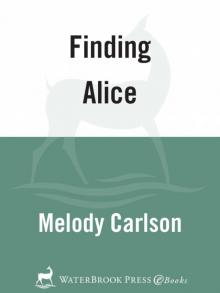 Finding Alice
Finding Alice Payback
Payback All for One
All for One Under a Summer Sky--A Savannah Romance
Under a Summer Sky--A Savannah Romance Face the Music
Face the Music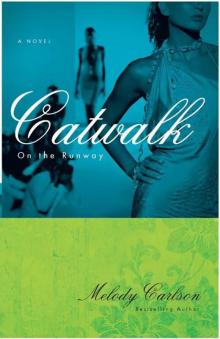 Catwalk
Catwalk Never Been Kissed
Never Been Kissed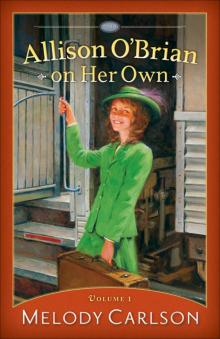 Allison O'Brian on Her Own
Allison O'Brian on Her Own An Irish Christmas
An Irish Christmas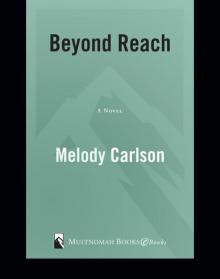 Beyond Reach
Beyond Reach Faded Denim: Color Me Trapped
Faded Denim: Color Me Trapped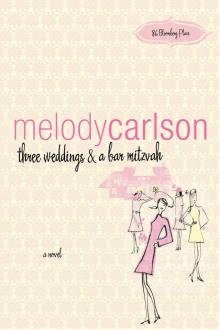 Three Weddings and a Bar Mitzvah
Three Weddings and a Bar Mitzvah Here's to Friends
Here's to Friends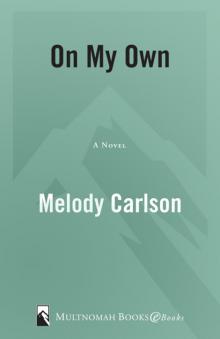 On My Own
On My Own River's Call
River's Call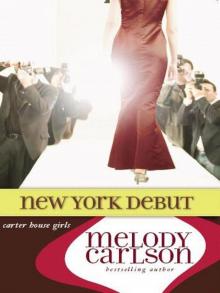 New York Debut
New York Debut Homeward
Homeward Love Finds You in Sisters, Oregon
Love Finds You in Sisters, Oregon Viva Vermont!
Viva Vermont! Notes from a Spinning Planet—Ireland
Notes from a Spinning Planet—Ireland Harsh Pink with Bonus Content
Harsh Pink with Bonus Content Perfect Alibi
Perfect Alibi The Christmas Pony
The Christmas Pony All Summer Long
All Summer Long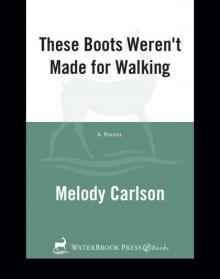 These Boots Weren't Made for Walking
These Boots Weren't Made for Walking Back Home Again
Back Home Again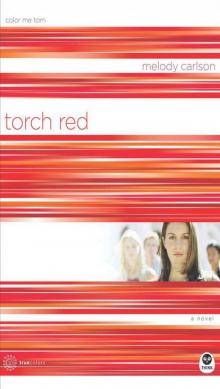 Torch Red: Color Me Torn with Bonus Content
Torch Red: Color Me Torn with Bonus Content Bitter Rose
Bitter Rose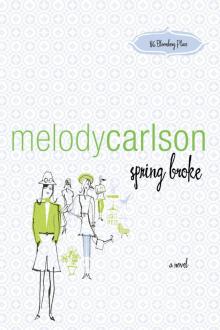 Spring Broke
Spring Broke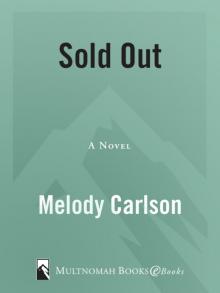 Sold Out
Sold Out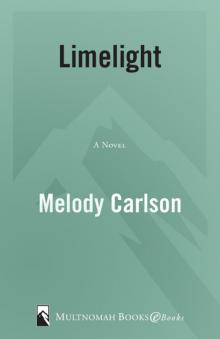 LimeLight
LimeLight Double Date
Double Date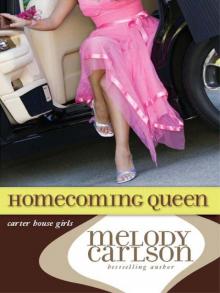 Homecoming Queen
Homecoming Queen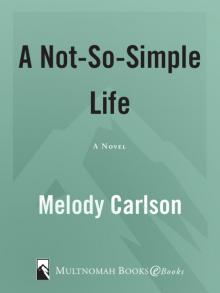 A Not-So-Simple Life
A Not-So-Simple Life My Name Is Chloe
My Name Is Chloe My Amish Boyfriend
My Amish Boyfriend Once Upon a Summertime
Once Upon a Summertime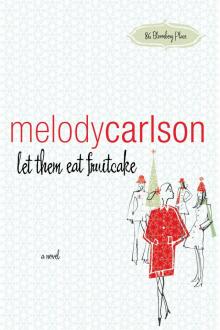 Let Them Eat Fruitcake
Let Them Eat Fruitcake Deep Green: Color Me Jealous with Bonus Content
Deep Green: Color Me Jealous with Bonus Content The Joy of Christmas
The Joy of Christmas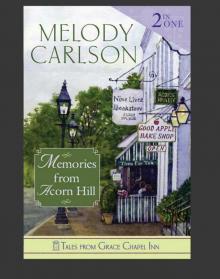 Memories from Acorn Hill
Memories from Acorn Hill Premiere
Premiere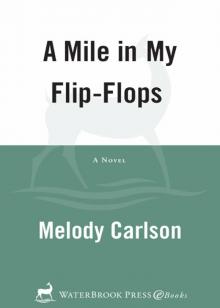 A Mile in My Flip-Flops
A Mile in My Flip-Flops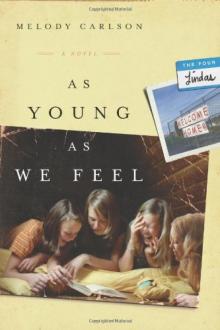 As Young As We Feel
As Young As We Feel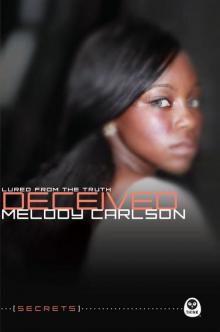 Deceived: Lured from the Truth (Secrets)
Deceived: Lured from the Truth (Secrets)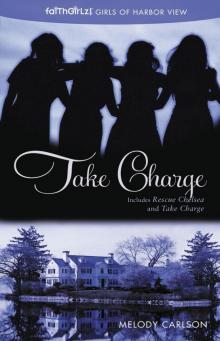 Take Charge
Take Charge Road Trip
Road Trip A Simple Song
A Simple Song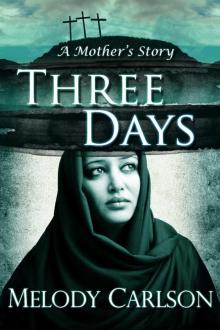 Three Days: A Mother's Story
Three Days: A Mother's Story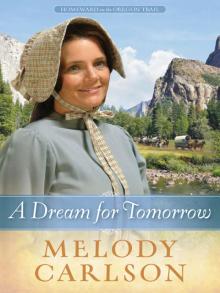 A Dream for Tomorrow
A Dream for Tomorrow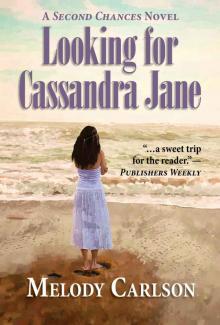 Looking for Cassandra Jane (The Second Chances Novels)
Looking for Cassandra Jane (The Second Chances Novels)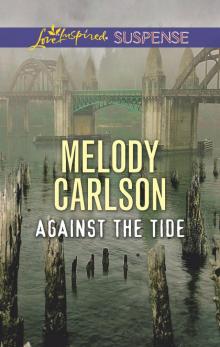 Against the Tide
Against the Tide Your Heart's Desire
Your Heart's Desire The Christmas Blessing
The Christmas Blessing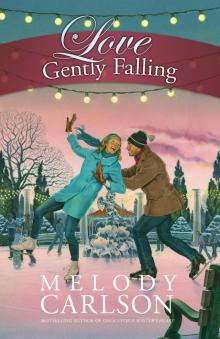 Love Gently Falling
Love Gently Falling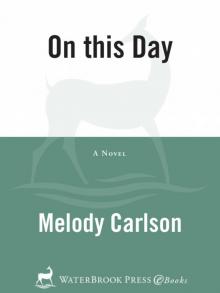 On This Day
On This Day The Christmas Joy Ride
The Christmas Joy Ride Ciao
Ciao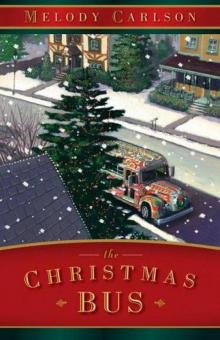 The Christmas Bus
The Christmas Bus Blade Silver: Color Me Scarred
Blade Silver: Color Me Scarred Dating Games #1
Dating Games #1 Double Take
Double Take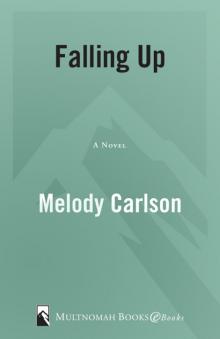 Falling Up
Falling Up Last Dance
Last Dance Westward Hearts
Westward Hearts Glamour
Glamour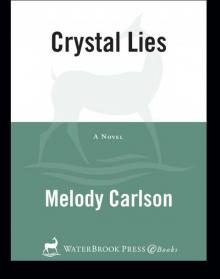 Crystal Lies
Crystal Lies The Best Friend
The Best Friend Prom Date
Prom Date The Christmas Angel Project
The Christmas Angel Project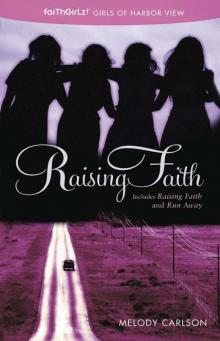 Raising Faith
Raising Faith The 'Naturals: Awakening (Episodes 1-4 -- Season 1) (The 'Naturals: Awakening Season One Boxset)
The 'Naturals: Awakening (Episodes 1-4 -- Season 1) (The 'Naturals: Awakening Season One Boxset)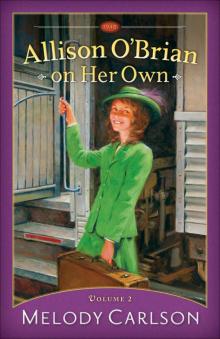 Allison O'Brian on Her Own, Volume 2
Allison O'Brian on Her Own, Volume 2 Notes from a Spinning Planet—Papua New Guinea
Notes from a Spinning Planet—Papua New Guinea Once Upon a Winter's Heart
Once Upon a Winter's Heart Damaged
Damaged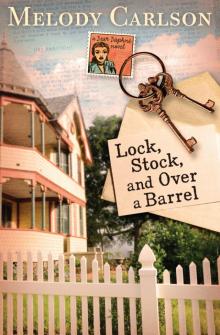 Lock, Stock, and Over a Barrel
Lock, Stock, and Over a Barrel Hometown Ties
Hometown Ties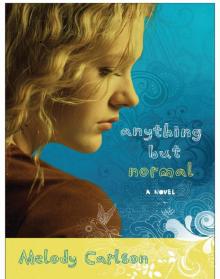 Anything but Normal
Anything but Normal Jerk Magnet, The (Life at Kingston High Book #1)
Jerk Magnet, The (Life at Kingston High Book #1) Damaged: A Violated Trust (Secrets)
Damaged: A Violated Trust (Secrets) Fool's Gold
Fool's Gold Girl Power
Girl Power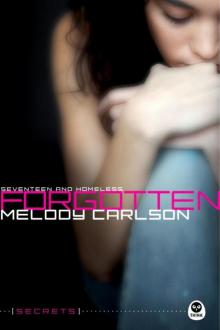 Forgotten: Seventeen and Homeless
Forgotten: Seventeen and Homeless Trading Secrets
Trading Secrets Blood Sisters
Blood Sisters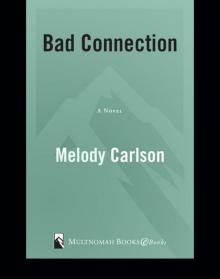 Bad Connection
Bad Connection Spotlight
Spotlight A Simple Christmas Wish
A Simple Christmas Wish Love Finds You in Martha's Vineyard
Love Finds You in Martha's Vineyard Angels in the Snow
Angels in the Snow A Christmas by the Sea
A Christmas by the Sea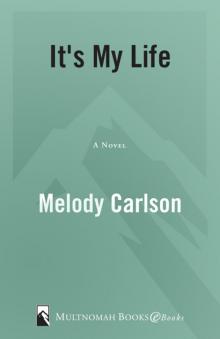 It's My Life
It's My Life Mixed Bags
Mixed Bags The Christmas Dog
The Christmas Dog Secret Admirer
Secret Admirer Love Finds You in Pendleton, Oregon
Love Finds You in Pendleton, Oregon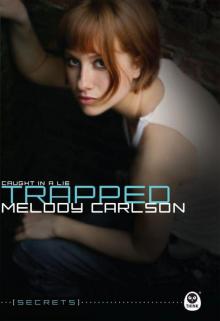 Trapped: Caught in a Lie (Secrets)
Trapped: Caught in a Lie (Secrets) The Gift of Christmas Present
The Gift of Christmas Present Hidden History
Hidden History Meant to Be
Meant to Be The Treasure of Christmas
The Treasure of Christmas Just Another Girl
Just Another Girl River's Song - The Inn at Shining Waters Series
River's Song - The Inn at Shining Waters Series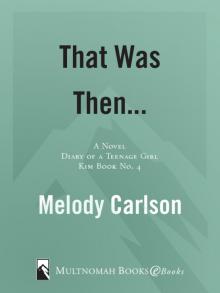 That Was Then...
That Was Then...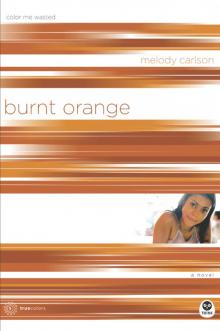 Burnt Orange
Burnt Orange Spring Breakdown
Spring Breakdown The Christmas Cat
The Christmas Cat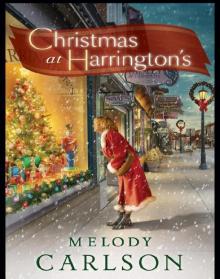 Christmas at Harrington's
Christmas at Harrington's